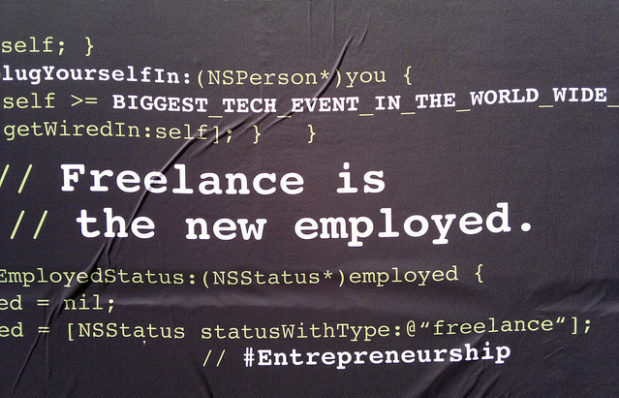Things to Consider Before You Quit Your Job and Go Freelance

It’s becoming more common for people to take on freelancing gigs, leaving their seemingly stable jobs for the more unsettled but flexible life of a full-time freelancer.
Millions of people have taken on side hustles in fields as varied as writing, customer service, and engineering, with some earning enough that a leap into working these jobs full-time seems doable, if not downright smart. Plus, who doesn’t want to be their own boss?
From the outside, freelancing looks a lot like working a regular job, except you can do it from your bed or from the beach if you so choose. The reality is more complicated, with added responsibilities, costs, and considerations that many freelancers aren’t aware of until it’s too late.
Before you quit your job and strike out alone as a freelancer, consider the following 10 questions and see how easily you answer them:
Do you know what you’re worth?
In your current role, you know your worth: You likely have a yearly or hourly salary, and perhaps additional health benefits, that add up to an amount that supports your lifestyle. That number is much more difficult to match when you work on a by-project basis.
Taking into account your experience and needs, calculate an hourly rate as well as a project rate for your work. You may need to discount these rates when first starting out in order to get your foot in the door with some clients, but your goal should be to work towards these rates and not look back.

When calculating your rates, don’t forget to take into account costs that are taken for granted by full-time workers. Your self-employment taxes (which will take up about a third of each check you receive), health care costs, time spent corresponding with clients, and other fees you accrue in your line of work should be built into every gig you price out.
Do you have a workspace?
It’s incredibly tempting when you first start freelancing to save money and assume you can work as efficiently from your kitchen table as you did your office.
The truth is, always working from your living space—your kitchen, your bed—is a recipe for burnout. It’s important to find or build a space that you dedicate solely to working, whether it’s a tax-compliant home office, a library, or a coworking space.
It may feel like a waste of money to pay someone to go sit in an office—didn’t you start freelancing so you wouldn’t have to do that?—but the benefits of coworking spaces are real: coworkers reportedly focus better, complete more tasks on time, and feel healthier than those who don’t work in such spaces. Plus, they report feeling more relaxed once they come home—a perfect example of how work-life balance is easily thrown out of whack when you work where you live.

Are you self-motivated?
There are legitimate pressures to get your work done when you have a traditional job. Your manager, your team, and your company at-large all rely on you to show up every day and get your work done.
Every morning you wake up as a freelancer, there’s only one person who expects you to get your work done, and that’s you. Even your clients, who contract you to work for them, can’t tell you when and how to work (though they may not hire you again if you consistently fail to deliver on time). So be honest with yourself: Are you self-motivated enough to get your work done?
If you need direction and guidance from external sources, the environment of coworking spaces and working alongside other freelancers may be helpful.
Do you have a financial safety net?
It’s good personal finance policy to have a rainy day fund you can dip into to cover unforeseen expenses. This is even more important when you’re a freelancer, as clients and gigs can come and go at a moment’s notice, leaving you without money to pay the bills next month.
Before you move into freelancing full-time, try to build up what most people consider to be the typical financial nest egg of three-to-six months income. That way, you’ll have something to sustain you through the lean periods that arise at any time.

Will you invest in helpful tools?
Businesses utilize a ton of digital tools nowadays to help get things done, from accounting and HR software to chat and collaboration apps. As a self-contained business, you should research and invest in a few tools that can help keep you organized, on track, and compliant. No more losing track of project deadlines, or failing to file your taxes accurately each quarter.
Some project management platforms offer free versions, but don’t be afraid to shell out a few bucks a month for tools designed to help you work better.
Should you create an LLC?
If you want to become a freelancer tomorrow, it’s as easy as taking on a freelance gig. There is no formal process of declaring your new freelance job. You simply become a sole proprietor.
Many freelancers, however, opt to create a Limited Liability Company, which is a simple business structure that separates their personal assets from their business assets.
While there is an additional tax burden that comes with creating an LLC, there are numerous benefits as well. Your LLC protects you from personal liability if your business is sued for any reason. Also, unlike other business structures, your LLC profits are only taxed once in a process known as pass-through taxation. And generally speaking, LLCs are flexible and inexpensive to maintain.
Do you have a website and a portfolio?
If you’re considering moving into freelancing full-time, you’ve likely identified possible clients who will help ease you into the lifestyle. But what then? A good freelancer is always open to new possibilities, because even your most-consistent client might suddenly cut ties for any number of reasons.
If you haven’t already, take the time to create and optimize your website, social media accounts, blog, and any other channels where a potential client might find you. Your work and resume should be easy to find, and your contact information prominently displayed. You’ll be surprised how much new work falls into your lap just because you make yourself available for it.

Are you comfortable negotiating?
Here’s another situation that calls for honesty about yourself. There are going to be times, especially early on, when a potential new client tells you they want to work with you, but your fees aren’t in their budget.
At first, you might take a discounted fee in order to establish a relationship and build a portfolio—but do that too often and you’ll fall behind on what you need. Therefore, you need to go to bat for yourself and negotiate fees that you feel are fair.
This will lead to some tough conversations. It will also lead to you potentially walking away from work and gaining nothing rather than something. But if you’re not willing to stand up to clients and tell them that you’re worth what you’ve quoted, you’ll never get what you deserve.
Do you have an exit strategy?
You should always have an exit strategy in mind in any role. When you enter the world of freelance, start planning for how you’ll transition out at some point. Will you use your experience gained in this capacity to apply for a job at another company in a year or two? Or will you ride this wave until you retire?
Either way, plan for retirement by opening a retirement account such as a Roth IRA, and talk to a financial planner about how to save for the future, both in the short- and long-term—so if the time does come to leave freelancing, you’ll be ready.
***
The decision to leave the safety of a traditional job for the freelance life can have incredible rewards. You’ll be entering a new era of flexibility and control over your life that the constraints of a traditional job can never match.
That being said, no situation is perfect and you’ll have to sacrifice other things in your pursuit of the freelancer lifestyle. Saving, planning, and negotiating are all integral parts of being a freelancer—so make sure you’re ready for it.
This guest post was authored by Meredith Wood

Meredith Wood is the Editor-in-Chief at Fundera, an online marketplace for small business loans that matches business owners with the best funding providers for their business. Specializing in financial advice for small business owners, Meredith is a current and past contributor to Yahoo!, Amex OPEN Forum, Fox Business, SCORE, AllBusiness and mor

